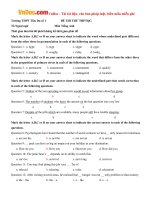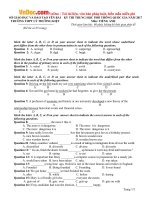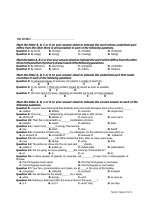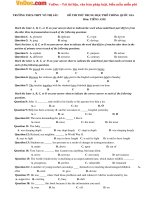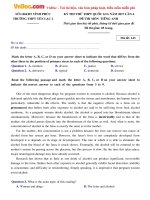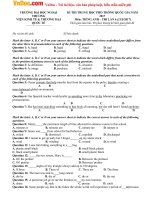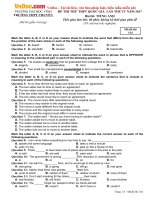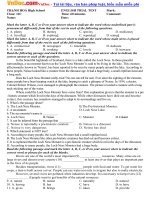Đề thi thử THPT Quốc gia năm 2017 môn Tiếng Anh trường THPT Chuyên Vĩnh Phúc
Bạn đang xem bản rút gọn của tài liệu. Xem và tải ngay bản đầy đủ của tài liệu tại đây (131.28 KB, 8 trang )
VnDoc - Tải
tài liệu, văn bản pháp luật, biểu mẫu miễn phí
SỞ GD & ĐT VĨNH PHÚC
ĐỀ THI KSCL THPTQG LẦN 3 NĂM HỌC 2016 – 2017
TRƯỜNG THPT CHUYÊN
MÔN TIẾNG ANH 12
VĨNH PHÚC
Thời gian làm bài: 60 phút
Choose the letter A, B, C, or D on your answer sheet to indicate the word whose
underlined part is pronounced differently from that of the rest in each of the following
questions
Question 1:
A. carry
B. marriage
C. parrot
D. barber
Question 2:
A. stool
B. bamboo
C. good
D. loose
Choose the letter A, B, C, or D on your answer sheet to indicate the word that differs
from the rest in the position of the main stress in the following questions
Question 3:
A. eternal
B. islander
C. terrorist
D. terrorist
Question 4:
A. optimistic
B. pessimistic
C. inhabitant
D. intervention
Choose the letter A, B, C, or D on your answer sheet to indicate the correct answer to
each of the following questions
Question 5: Deforestation
A. starts out
devastative floods in many parts of the world.
B. makes up
Question 6: Factories will
A. be running
C. brings up
D. results in
largely by robots.
B. running
C. be run
Question 7: The world people are now aware
D. run
the importance of environmental
protection.
A. of
B. for
C. about
D. to
Question 8: : Jane couldn’t decide where to go for her holidays. She didn’t do anywhere the end.
A. in
B. to
C. on
Question 9: We arrived home late last night. We
A. have
B. had
D. at
to wait half an hour for a taxi.
C. ought
Question 10: The search for a new vaccine took priority
A. above
Question 11: Great
A. diversity
B. over
all other medical researches.
D. on
should be given to the conservation of endangered species.
B. priority
Question 12: Robots will even
shops, and homes.
C. to
D. must
C. opportunity
D. condition
everywhere in factories, schools, offices, hospitals,
VnDoc - Tải
tài liệu, văn bản pháp luật, biểu mẫu miễn phí
A. seen
B. see
C. saw
D. be seen
Question 21: At last, we succeeded in persuading those boys and girls to join our picnic.
A. At the end
B. In the end
C. Lastly
D. Endlessly
Choose the letter A, B, C, or D on your answer sheet to indicate the word that is
OPPOSITE in meaning to the underlined part in each of the following questions
Question 22: “That is a well-behaved boy whose behavior has nothing to complain about.”
A. behaving cleverly
B. behaving nice
C. good behavior
D. behaving improperly
Question 23: He mentioned in particular electronics, his major at university.
A. one and all
B. in general
C. on whole
D. in all
Choose the letter A, B, C, or D on your answer sheet to indicate the most suitable
response to the following exchanges.
Question 24: “You haven’t been to the bank today, have you?” “
.”
A. No, I haven’t. I’m about to.
B. Yes, I haven’t. I’m busy.
C. No, I haven’t any money.
D. No, I have. I got some money.
Question 25: Peter: “What a great haircut, Lucy!” Lucy: “
.”
A. Thanks. It’s very kind of you to do this
B. You think so? I think it’s a bit too short
C. Oh yes, It’s very unfashionable
D. It’s my pleasure.
Read the following passage and choose the letter A, B, C, or D on your answer sheet to
indicate the correct word or phrase that best fits each of the numbered blanks
Why is it that many teenagers have the energy to play computer games until late at night but
can’t find the energy to get out of bed (26)
_ for school? According to a new
report, today’s generation of children are in danger of getting so (27)
are putting their mental and physical health at (28)
seven to eight hours’ sleep a
night, (29)
sleep that they
. Adults can easily survive on
teenagers require nine or ten hours.
According to medical experts, one in five youngsters (30)
anything between
two and five hours’ sleep a night less than their parents did at their age.
Question 26:
A. behind time
B. at time
C. about time
D. in time
Question 27:
A. few
B. less
C. little
D. much
Question 28:
A. threat
B. jeopardy
C. danger
D. risk
Question 29:
A. whereas
B. so
C. or
D. because
VnDoc - Tải
Question 30:
tài liệu, văn bản pháp luật, biểu mẫu miễn phí
A. brings
B. puts
C. makes
D. gets
Read the following passage and choose the letter A, B, C, or D on your answer sheet to
indicate the correct answer to each of the questions
BLUE MOON
“Blue Moon” is a term that is used to describe the phenomenon of a second full moon
occurring in one month. How could two full moons possibly occur in a single month? It is not
nature’s fault; the natural phrases of the moon do not perfectly match up with the Roman
calendar.
Although still used today, this calendar was devised by Julius Caesar and Augustus Caesar
over 2000 years ago. While the calendar works well, the method that they used does not
match the lunar cycle exactly. Thus, occasionally the moon will go through its “full” phrase
twice before the month changes.
A “blue moon” is an uncommon event. And it rare occurrence of a eventually led to the usage
of the phrase “once in a blue moon”. This phrase was commonly used to indicate an event
that could never happen. Over time, the meaning of the phrase changed from something that
seldom happens. Today, this phrase is used to indicate extremely rare events, the absurd, or
things that never happen.
Question 31: What is the main purpose of this passage?
A. To illustrate the features of the moon.
B. To inform readers of the difference between the Roman calendar and the lunar calendar
C. To explain the definition and the usage of “blue moon”
D. To support the importance of the lunar calendar
Question 32: According to the passage, to what does the term “blue moon” refer to?
A. Events that could never happen
B. The second full moon in one month
C. A moon with the color blue
D. Cold nights causing the moon to appear blue
Question 33: The word “phrase” in the passage is closet in meaning to
A. Position
B. Cycle
C. Shape
Question 34: Why doesn’t our calendar match the lunar cycle exactly?
A. Our calendar was designed by humans
B. It has more days than it sound
C. The lunar cycle is wrong
D. Our calendar was not designed by humans
D. Influence
VnDoc - Tải
tài liệu, văn bản pháp luật, biểu mẫu miễn phí
Question 35: The word “absurd” in the passage is closet in meaning to
A. Ridiculous
B. Frequent
C. Normal
D. Interesting
Question 36: According to the passage, which of the following is NOT true?
A. The meaning of the “blue moon” changed over the years.
B. The Roman calendar was invented by Julius Caesar and Augustus Caesar
C. The phrase “once in a blue moon” could refer to two people eating dinner together
D. The Roman calendar is still in use today.
Question 37: Which of the following can be inferred from the passage?
A. The phrase “blue moon” refers to the frequency of events
B. The Roman calendar matches the natural phrases of the moon.
C. The usage of “blue moon” has not changed.
D. Two full moons often occur in one month.
Read the following passage and choose the letter A, B, C, or D on your answer sheet to
indicate the correct answer to each of the questions
Many flowering plants woo insect pollinators and gently direct them to their most
fertile blossoms by changing the color of individual flowers from day to day. Through color
cues, the plant signals to the insect that it would be better off visiting one flower on its bush
than another. The particular hue tells the pollinator that the flower is full of far more pollen
than are neighboring blooms. That nectar-rich flower also happens to be fertile and ready to
disperse its pollen or to receive pollen the insect has picked up from another flower. Plants do
not have to spend precious resources maintaining reservoirs of nectar in all their flowers.
Thus, the color-coded communication system benefits both plants and insects.
For example, on the lantana plant, a flower starts out on the first day as yellow, when
it is rich with pollen and nectar. Influenced by an as-yet-unidentified environmental signal,
the flower changes color by triggering the production of the pigment anthromyacin. It turns
orange on the second day and red on the third. By the third day, it has no pollen to offer
insects and is no longer fertile. On any given lantana bush, only 10 to 15 per cent of the
blossoms are likely to be yellow and fertile. But in tests measuring the responsiveness of
butterflies, it was discovered that the insects visited the yellow flowers at least 100 times
more than would be expected from haphazard visitation. Experiments with paper flowers
and painted flowers demonstrated that the butterflies were responding to color cues rather
than, say, the scent of the nectar.
In other types of plants, blossoms change from white to red, others from yellow to
red, and so on. These color changes have been observed in some 74 families of plants.
VnDoc - Tải
tài liệu, văn bản pháp luật, biểu mẫu miễn phí
Question 38: The first paragraph of the passage implies that insects benefit from the colorcoded communication system because
A. they can gather pollen efficiently.
B. the colors hide them from predators.
C. the bright colors attract fertile females
D. other insect species can not understand the code.
Question 39: The word “woo” is closest in meaning to
A. frighten
B. trap
C. deceive
D. attract
C. an insect
D. a signal
Question 40: The word “it” refers to
A. a plant
B. a blossom
Question 41: The word “hue” is closet in meaning to
A. smell
B. shape
C. texture
D. color
Question 48: My grandfather started collecting stamps when he was 65.
A. My grandfather took up stamps collecting when he was 65.
B. My grandfather took off stamps collecting when he was 65.
C. My grandfather took away stamps collecting when he was 65.
D. My grandfather took in stamps collecting when he was 65.
Question 49: We didn’t get home until it was almost dark.
A. It was almost dark, which prevented us from getting home.
B. We decided to go home when it grew dark.
C. Since it was almost dark, we decided not to go home.
D. It was almost dark when we got home.
Question 50: Peter woke up early because he didn’t want to miss his flight.
A. Peter woke up early so that he wouldn’t miss his flight.
B. If Peter had woken up early, he wouldn’t have missed his flight.
C. Waking up early, Peter didn’t miss his flight.
D. As Peter woke up early, he was unlikely to miss his flight.
Đáp án
1-D
2-B
3-A
4-C
5-D
6-C
7-A
8-A
9-B
10-B
11-A
12-D
13-C
14-C
15-A
16-C
17-NA
18-B
19-D
20-B
21-B
22-D
23-D
24-A
25-B
26-D
27-C
28-D
29-A
30-D
31-C
32-B
33-B
34-A
35-A
36-C
37-A
38-A
39-D
40-C
VnDoc - Tải
41-D
42-B
tài liệu, văn bản pháp luật, biểu mẫu miễn phí
43-C
44-A
45-D
46-C
47-B
48-A
49-D
LỜI GIẢI CHI TIẾT
Question 1: Đáp án D
carry /'kæri/
marriage /'mæridʒ/
parrot /'pærət/
barber /'bɑ:bə/
Question 2: Đáp án B
stool /stu:l/
bamboo /bæm'bu:/
good /gud/
loose /lu:s/
Question 3: Đáp án A
Phần A trọng âm rơi vào âm tiết thứ 2, còn lại là thứ nhất
eternal /i'tɜ:nl/
islander /'ailəndə[r]/
terrorist /'terərist/
subsidy /'sʌbsidi/
Question 4: Đáp án C
Phần C trọng âm rơi vào âm tiết thứ 2, còn lại là thứ 3
optimistic /,ɒpti'mistik/
pessimistic /,pesi'mistik/
inhabitant /in'hæbitənt/
intervention /,intə'ven∫n/
Question 5: Đáp án D
Result in: để lại kết quả ở cái gì
start out: khởi hành
make up: trang điểm, quyết định, dọn gọn ghẽ,…
bring up: đem lên, mang lên; nuôi nấng, giáo dục, dạy dỗ…
Dịch: Nạn phá rừng tạo hậu quả nhiều cơn lũ tàn phá ở nhiều nơi trên thế giới
Question 6: Đáp án C
Ở đây chủ ngữ là Factories (vật) => câu được chia ở dạng bị động
Will be run: sẽ được điều hành
50-A
VnDoc - Tải
tài liệu, văn bản pháp luật, biểu mẫu miễn phí
Dịch: Các nhà máy sẽ được vận hành phần lớn bởi robo
Question 7: Đáp án A
Cấu trúc: To be aware of something: nhận biết, biết về cái gì
Dịch: Người dân trên thế giới hiện nay nhận thức được tầm quan trọng của bảo vệ môi
trường.
Question 8: Đáp án A
Phân biệt giữa in the end và at the end:
- at the end: cuối, phía cuối, phần cuối (của cái gì, ví dụ: cuối tháng at the end of the month,
cuối sự kiện at the end of the event,…)
- in the end = finally, eventually = cuối cùng
=> chọn in the end
Dịch: Jane không thể quyết định nên đi nghỉ ở đâu. Cuối cùng cô ấy không đi đâu cả.
Question 9: Đáp án B
Must + V (không có giới từ to) => D loại
Ought to: nên => về nghĩa trong câu thì không phù hợp => loại
Trong câu đang dùng thì quá khứ, do đó không thể sử dụng have => loại
Đáp án: had to: phải…
Dịch: Tối qua chúng tôi về nhà muộn. Chúng tôi đã phải đợi taxi nửa tiếng
Question 10: Đáp án B
Cấu trúc take priority over something: ưu tiên, đặt hàng đầu
Dịch: Việc tìm một vacxin mới chiếm ưu tiên trên mọi nghiên cứu khác
Question 45: Đáp án D
Từ " haphazard" là gần nhất trong ý nghĩa với từ nào sau đây?
A. may mắn
B. kỳ vọng
C. Nguy hiểm D. ngẫu nhiên
Haphazard ~ random: lộn xộn, ngẫu nhiên
it was discovered that the insects visited the yellow flowers at least 100 times more than
would be expected from haphazard visitation.
nó đã được phát hiện ra rằng các loài côn trùng đã ghé thăm những bông hoa màu vàng hơn ít
nhất 100 lần so với dự đoán các cuộc ghé thăm ngẫu nhiên
Question 46: Đáp án C
All the guests enjoyed themselves at the party apart from George.
Tất cả khách đều cảm thấy vui thích ở bữa tiệc ngoại trừ George.
= C. George was the only one guest who didn’t enjoy himself at the party.
George là khách duy nhất không vui thích ở bữa tiệc
VnDoc - Tải
tài liệu, văn bản pháp luật, biểu mẫu miễn phí
A. George không thích bữa tiệc như các khách khác
B. George là khách duy nhất nghĩ bữa tiệc đáng vui thích
D. George, không như các khách khác, có khoảng thời gian vui vẻ tại bữa tiệc
Question 47: Đáp án B
It was Jane who came up with the idea for the sales promotion.
Đó là Jane người đã đưa ra ý tưởng cho việc thúc đẩy bán hàng.
= B. Jane was the brain behind the sales promotion.
Jane là bộ não đằng sau việc thúc đẩy bán hàng
A. Jane hoàn toàn bị ám ảnh với việc thúc đẩy bán hàng
C. Bán hàng tăng là thành quả của sự cố gắng của Jane
D. Không ai ngoài Jane thích ý tưởng cho việc thúc đẩy bán hàng
Question 48: Đáp án A
My grandfather started collecting stamps when he was 65.
Ông tôi bắt đầu sưu tập tem khi ông 65 tuổi
= A. My grandfather took up stamps collecting when he was 65.
Take up = start doing st: bắt đầu làm một việc gì
Question 49: Đáp án D
We didn’t get home until it was almost dark.
Chúng tôi không về đến nhà cho đến tận khi trời gần tối
= D. It was almost dark when we got home.
Trời đã gần tối khi chúng tôi về đến nhà
A. Trời gần tối, điều này ngăn cản chúng tôi về nhà
B. Chúng tôi quyết định về nhà khi trời tối
C. Bởi vì trời gần tối, chúng tôi quyết định ko về nhà
Question 50: Đáp án A
Peter woke up early because he didn’t want to miss his flight.
Peter dậy sớm vì anh ko muốn lỡ chuyến bay
= A. Peter woke up early so that he wouldn’t miss his flight.
Peter dậy sớm để anh ấy sẽ ko bị lỡ chuyến bay
B. Nếu Peter dậy sớm, anh ấy đã ko bị lỡ chuyến bay
C. Dậy sớm, Peter ko bị lỡ chuyến bay

